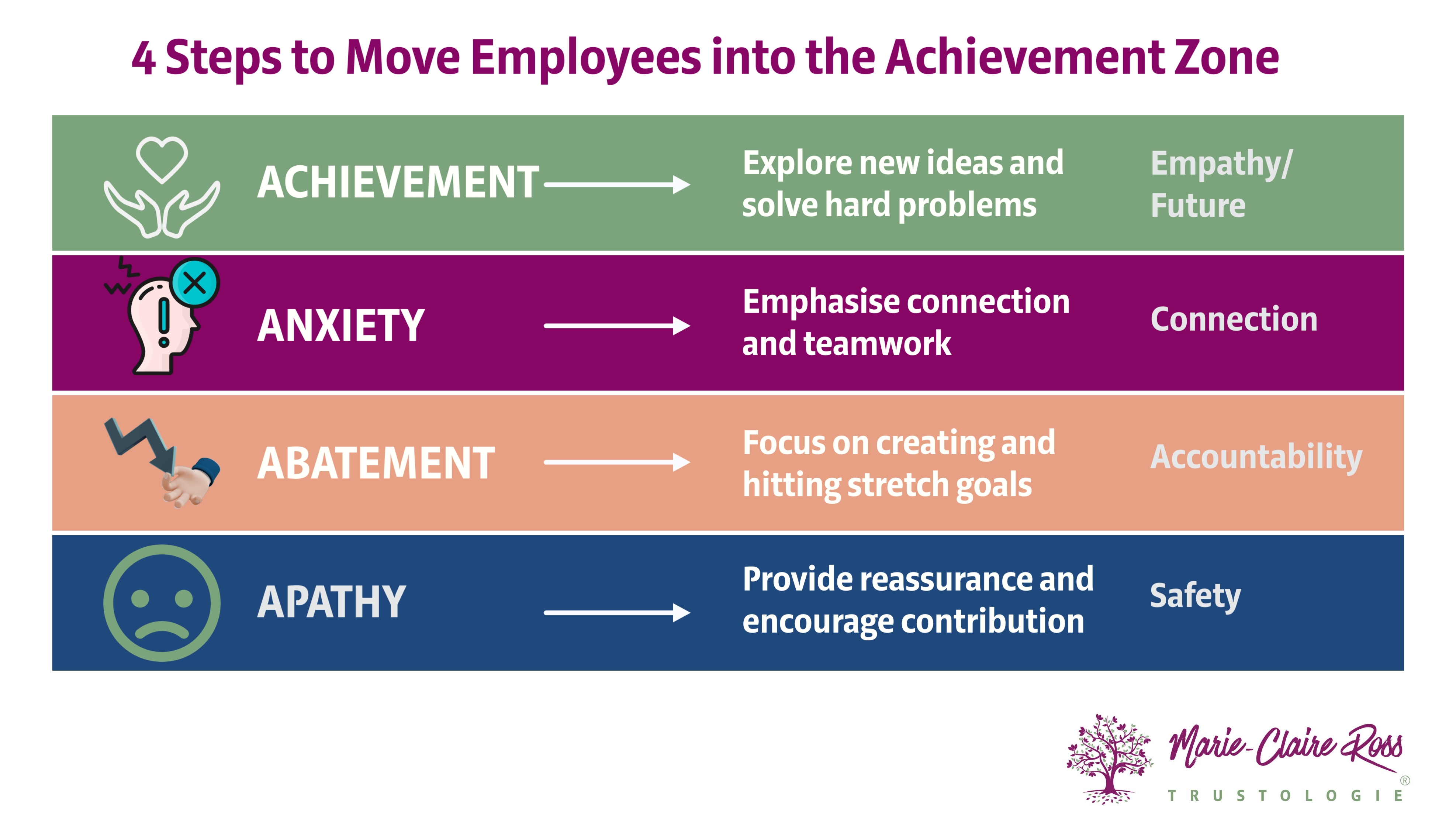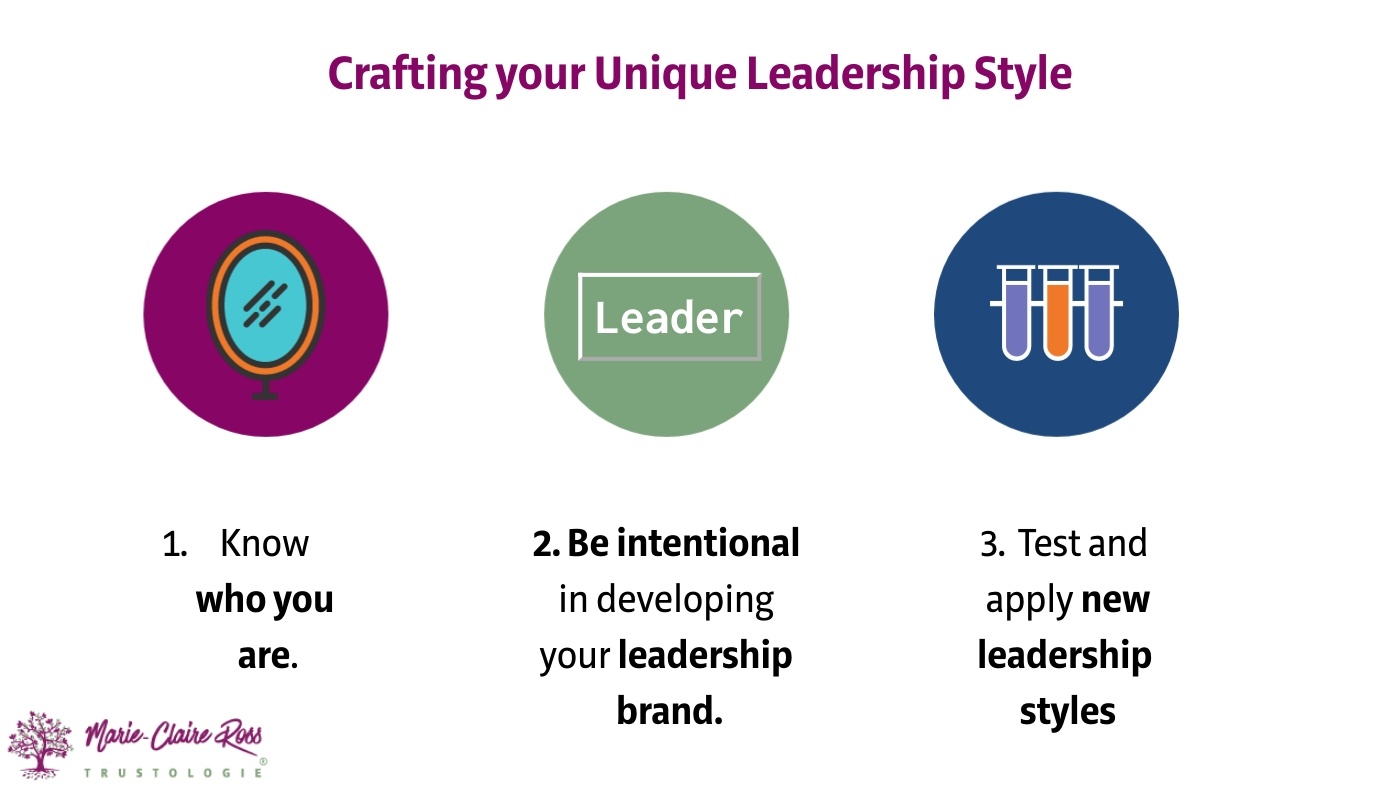11 min read
4 Practical Strategies for Better Emotional Management in the Workplace
I have a friend who often finds herself at the mercy of her emotions. Recently, she called me to rehash a confrontation she’d had with a group of...
Develop leaders, strengthen executive teams and gain deep insights with assessments designed to accelerate trust and performance.

Transform how your leaders think and perform with keynotes that spark connection, trust and high-performance cultures.

Explore practical tools, thought-leadership and resources to help you build trusted, high-performing teams.

Trustologie® is a leadership development consultancy founded by Marie-Claire Ross, specialising in helping executives and managers build high-trust, high-performing teams.

6 min read
Marie-Claire Ross : Updated on May 24, 2023

Around ten years ago, I used to belong to a CEO mastermind group that met regularly to discuss business issues.One of the members ran a successful chain of retail food stores. During a group dinner he confided to me about the personal issues he was having at home.
I was surprised at how he managed to keep himself together when his home life was clearly not optimal. So I questioned him on what he did to maintain his optimism at work and he said "I compartmentalise. When I am at work, I don't think about my personal life. It is kept separate. While I am at home, I don't discuss work with my family. That seems to work for me."
Today, we know this approach is not only impossible, but really unhealthy. The brain doesn't have a magical ability to separate work or personal experiences.
As Dr Tara Swart, the author of The Source says, "It is not productive to our brain power - to imagine that if we are having problems with our children at home or have just been through a relationship break-up, this has no effect on our work performance, or indeed if we lose our job this has no effect on our family relationships, or friendships."
Keeping our personal and work lives separate is an old leadership style approach that is very much in the style of hiding your mental health issues in case you are seen as "weak." Diligently working to separate our work and personal lives is not only exhausting, but a waste of brain resources.
The truth is that our personal stuff interferes with our work, whether we like at or not. And vice versa.
If we want to be a successful leader, we have to understand that we are not different people in our personal or professional lives. We are the same person. When we start to have issues in one sphere, it impacts the other. Whether we like it or not. Or more importantly, whether we are conscious of it or not.
Understanding how our personal or work issues impact our decisions, wellbeing and energy levels is an important part of working on our self-awareness. A key capability to successful leadership.
Of course, it's not healthy to announce to everyone in minute detail everything that's going on in your home life. So let's take a look at how to strike a healthy balance between the two spheres of life.
1. Limiting what and when you share
People don't need to know everything about you.
Intentionality about what personal information you do share is critical. We all have the over-sharer in the office who talks far too much about the minutiae of their lives in almost exasperatingly boring minute detail.
Most aware people know not to do that.
Where we often feel conflicted is around how much to share about the personal burdens we are bottling up. This could be due to feeling shameful, guilty or fearful that people will negatively judge us. Sometimes they are the very things we do need to share - with people we can trust.
At work, our social interactions are important to our wellbeing. While not everyone is a close friend, membership in a team that has gone through lots of ups and downs unites people together.
We need to feel safe expressing what's going on in our life. And sometimes we feel the need to share.
As a rule of thumb, you want to consider how long you have known a person before you share more personal information.
Research published in Journal of Social and Personal Relationships found a meaningful depth of relationships occurs after about 60 hours invested together. A strong relationship built over time, tends to become stronger with the sharing of intimate details.
But sharing too much and too soon can potentially damage a relationship. Research professor Brené Brown coined this as “floodlighting.” The act of oversharing personal details with individuals who aren’t open to receive.
From a leadership perspective, it is wise to share things going on in your personal life that might be impacting your mood, ability to concentrate or your ability to spend time with your team. Most people will want to help you or make things easier for you.
"Like flowers, relationships don't grow in the dark. Relationships bloom in the light of self-disclosure."
Ian Morgan Cron, The Road Back to You
The truth is that without some type of disclosure people will gossip and try and work it out themselves. Your best bet is to share what is comfortable. Not only will it help your team work better with you, but it sends the message that it's okay to have personal issues. Just make sure that you don't share with the sole intention of gaining sympathy or attention.
2. Understanding the Whole Person Perspective
The interactions of different parts of our lives has a flow on effect.
Whatever we learn at work or in our personal lives improves our work lives and so on. This is also important to clarify when leading others.
Consider undertaking a Whole Person Review when leading your people. This means being able to have open conversations with your direct reports about their personal goals, so that you can link them to their professional goals. This is a handy way to motivate employees.
As Dr Paul Zak a psychologist, wrote in the book, The Trust Factor, the Whole Person Review process is based on:
In the book, Elevate your Team by Robert Glazer, he discusses the need for leaders to develop capacity in four areas. These include spiritual capacity (understanding who you are), intellectual capacity (improving how you think, learn and execute), physical capacity (health and wellbeing) and emotional capacity (how you react in emotional situations).
As Glazer, says "The key isn’t to make yourself into a better employee at the expense of your personal life; the goal is holistic growth that elevates all facets of your performance."
Critical to high performance is thinking in a more integrative way, as well as integrating the different aspects of our lives.
3. Setting Clear Work-Life Boundaries
Interestingly, while I find some leaders struggle to reconcile both their personal and work personas, they freely allow their work tasks to merge into their personal lives.
Employees who neglect their personal life and work more than 55 hours per week have a 1.66 times higher risk of depression, 1.74 times higher risk of anxiety, and 1.3 times higher risk of coronary heart disease and stroke.
As a leader, you set the tone for your team. Over-working sends a bad message to your team that working long hours is an expectation.
You need to role model healthy work behaviours by taking regular time off, staying at home when you are sick and taking time off on the weekend. Encouraging hybrid work is also a healthy option for you and your team.
4. Understanding that not everyone wants to share
There will always be the one enigma at work. The one who keeps their personal life so out of reach that people make a guessing game about what they do on weekends. Things like "Do you think they're a furry? or "Do you think they have a secret addiction?"
Today, we live in a world where we no longer have to compartmentalise parts of ourselves in the workplace to feel like we belong. It's not like ten plus years ago where common career advice was to hide any type of subculture you belonged to.
People need to trust that sharing is safe. Trust takes time to build and requires consistent behaviours over time. You can tell when people appear to be more trusting when they start to reveal little pieces about themselves.
As a leader, give people the time and space to share when they are comfortable.
Theoretically, we should feel safer today than the past. Yet, social media has given many people good reasons to not feel safe. It's okay to draw the line on personal matters that do not feel okay to divulge. This includes allowing other people to do the same (including those who like to dress up as furry animals on weekends. And yes, that's a thing.)
Back in 2014, Gwyneth Paltrow popularised the term conscious uncoupling when referring to her amicable divorce with Chris Martin the frontman of the band Coldplay.
I'd like to recommend that leaders and employees consciously couple their personal and work lives. They co-exist. You can't separate them out. Vainly attempting to decouple them only makes you unaware of how your personal issues are impacting your work life and so on. It also means you are less likely to have empathy for your team members when they are going through a rough patch.
For some leaders, merging personal and work together can be quite confronting. But the more you try and separate them, the more they have a tendency to sneak in together and upend your life.
While consciously coupling* might not be within your comfort zone, letting people into your life will improve your stress and wellbeing.
Research has found that workers are happier and satisfied with their work when they feel they can be themselves. A study by the University of Exeter found when people feel they have to conceal too many personal characteristics, they have lower self-esteem, less job satisfaction and reduced commitment at work.
It makes sense. We are all human with messy lives. Everyone goes through stuff. It doesn't make you less of a person. Pretending that everything is fine when it's not isn't helpful to you or the people you work with or love.
It's time to embrace the messiness of our work and personal lives and allow others to feel comfortable doing the same.
* I do get that coupling means a different thing in Paltrow lingo, but I just think consciously coupling has a nice ring to it. Damn the English language for having words with so many multiple meanings!
For example, the quality of team leadership, levels of psychological safety and the presence (or absence) of colleague support were found to be critical in engaging or disengaging teams. This confirms previous studies that suggests the extent to which we are supported, trusted and empowered by our manager; the support we receive from our colleagues; and how safe we feel to bring our ‘whole selves’ to work (Laloux, 2014) are some of the strongest predictors of team engagement (Bailey et al, 2017).
but it’s worth thinking about what this really means. Should you share every personal detail? How much is too much? How much is enough?

11 min read
I have a friend who often finds herself at the mercy of her emotions. Recently, she called me to rehash a confrontation she’d had with a group of...

9 min read
True leadership presence isn’t a performance or a set of charisma hacks; it is the felt experience of who you are being in the room. By cultivating...

13 min read
As teams return from their summer (or winter) break, you may notice subtle shifts in your team’s energy. Even if the end of year was positive, a new...

The world of work is changing and soon we will have five generations in the workforce. Younger generations refuse to accept the “command and control”...

Emerging leaders often kickstart their leadership journey by mirroring the practices of inspirational mentors.